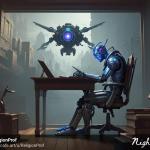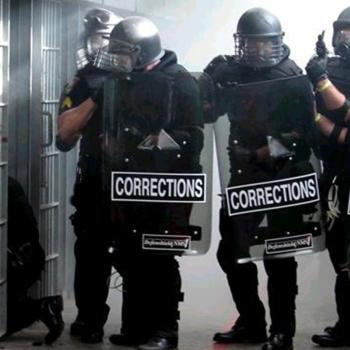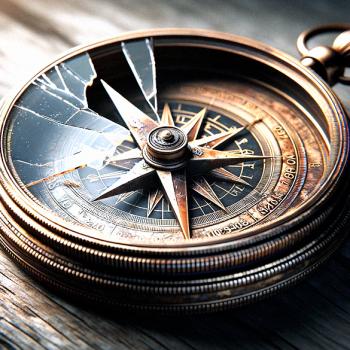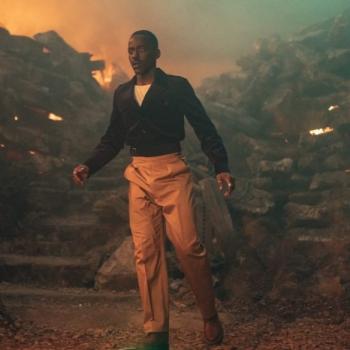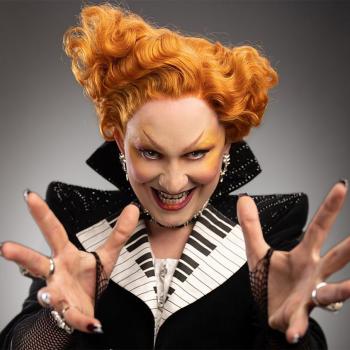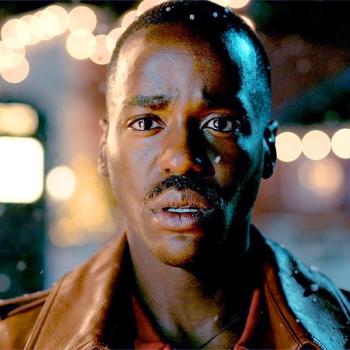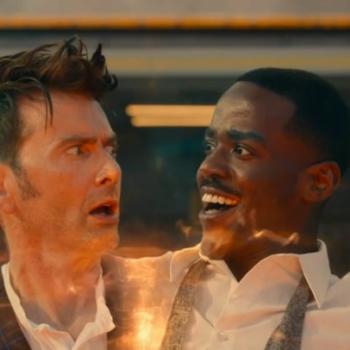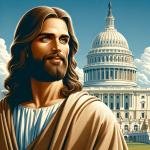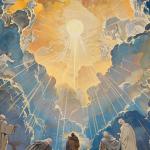Doctor Who has returned not so much with a two-parter as with two standalone episodes released at once. The first of the two episodes is called “Space Babies” and I suspect that you’ll find the number of times the Doctor utters that phrase in the episode somewhat tedious. Nevertheless, it is a fun and funny episode with many of the sorts of elements that one would expect from Doctor Who.
Ncuti Gatwa as the Doctor is superb, inhabiting the role and bringing an authentic sense of continuity while also bring fresh and new. There was an inkling of this being the case previously, but a holiday special and a brief appearance in the context of regeneration were not enough to really get a sense. If this is a sign of things to come, it is a positive one. I’m a bit worried about the silliness of some scripts, but not at all about the casting.
The Doctor speaks surprisingly candidly about who he is and where he comes from, not merely bearing a melancholy burden he hesitates to share as in the past, but openly speaking about his people as victims of a genocide. His planet died but he says that for that very reason and in that very context he is “so so glad to be alive.”
To The Distant Past (Dinosaurs and a Butterfly)
There is a quick trip back to the age of the dinosaurs, and a comedic treatment of the old time travel paradox about possibly changing history by stepping on a butterfly. The Doctor asks who would ever manage to step on a butterfly, but Ruby does and suddenly takes on a different appearance and character as a result of evolutionary history being rewritten. The Doctor realized he needs to reactivate the TARDIS’ “Butterfly Compensation” setting. A reference to Star Trek leads the Doctor to say that he needs to visit there some day. Graphic novels have explored crossovers and so this statement rendered all of that non-canonical!
Talking about the broken chameleon circuit, the Doctor quips that “Most of the universe is knackered”
To The Distant Future (and the Space Babies)
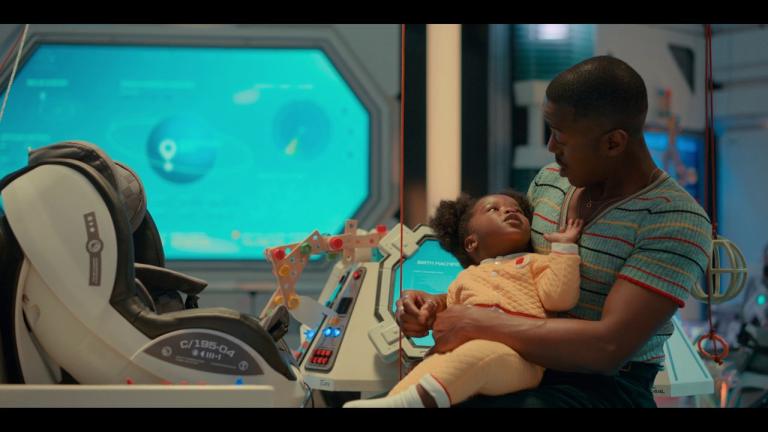 When the Doctor says that there are “no such thing as monsters, just creatures you haven’t met yet,” the episode will test whether that is true. But first we encounter a space station with a parthenogenesis machine. If you don’t recognize the term, it comes from the Greek words not only for beginning (you recognized “Genesis”) but also “virgin.” It is thus a “virginal conception machine.” This is but one of several subtle or quick passing references to things that are the purview of religion.
When the Doctor says that there are “no such thing as monsters, just creatures you haven’t met yet,” the episode will test whether that is true. But first we encounter a space station with a parthenogenesis machine. If you don’t recognize the term, it comes from the Greek words not only for beginning (you recognized “Genesis”) but also “virgin.” It is thus a “virginal conception machine.” This is but one of several subtle or quick passing references to things that are the purview of religion.
I loved that Ruby’s reaction to this glimpse of the future was such an enthusiastically positive one: “We made it. The human race, we survived. We went to the stars.” In an era in which there is a lot of climate-related pessimism, we need this optimism. It is a worldview, in some ways a religious faith, that humanity has a future, and that hope is essential to our survival. (See Octavia Butler’s Parable of the Sower and Parable of the Talents for arguably the best sci-fi exploration of this.)
Returning to the episode, the Doctor’s comment on his own path is also cool. He notes that he has no job, no bills, but freedom. We then learn that they have happened on a baby farm…run by babies. The reaction of the babies is “Mummy and daddy are here!” It is hilarious and tragic all at once. Asking whether, by staying babies yet also learning to run the station they have “grown up wrong,” the Doctor replies comfortingly, “Nobody grows up wrong. You are what you are and you’re fantastic.” The Doctor shares still more about his life as an orphan, a foundling. He says (I’m not sure I caught the exact wording here, “There’s no one else like me in the universe and that’s true of everyone. That’s not a problem, that’s a superpower.”
(Space) Babies and Technology
We hear the voice of Nan-E who we think is a computer but eventually discover is a human named Jocelyn who stayed behind to keep things running on the space station as best she could. Although we understand that this is more than a full-time job, the fact that the babies have never had a hug indicates that Jocelyn has realized she could not provide all the babies with the kind of motherly attention they would need in person, and so has opted to hide behind the machine persona. As we live in an era of increased virtual interaction and AI, in which churches and educational institutions are wrestling with what can be done remotely and what needs in-person connection with other human beings, this easy-to-miss detail deserves attention.
The scriptwriters then seized an opportunity to address a contemporary issue by having a character explain what led to the situation of “space babies” being born and growing in space on their own after the adults had been forced to leave the station. It is illegal to switch off the baby-making machine, even though the babies are going to be left uncared for. When Jocelyn says that the world that does such things is a “very strange planet” Ruby responds by saying it is not that strange.
Enter the Bogeyman
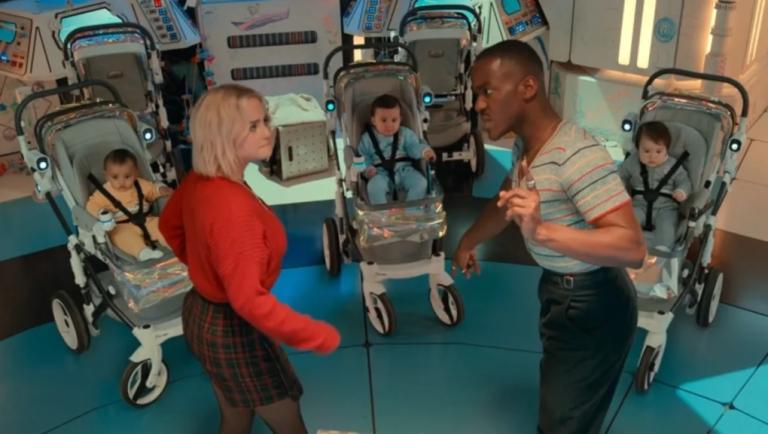 If religious views on conception, abortion, and IVF are in the background in that, there is a brief explicit humorous appearance of religion when Eric goes to confront the “bad doggy” that they have been fearing and calling the bogeyman. When Jocelyn shouts, “For God’s sake Eric, run!” a computerized voice responds with, “Eric invoking the deity. Increasing acceleration.” As a person who teaches and writes about theological matters, I don’t want to merely chuckle at the joke. Even non-religious people may utter a phrase like this, and whether religious or not, a prayer in a crisis will not change the way your engine functions. One of the challenges of doing theology in a scientific era is figuring out what if anything religion can and should mean in the context of this greater degree of understanding and control of the natural world.
If religious views on conception, abortion, and IVF are in the background in that, there is a brief explicit humorous appearance of religion when Eric goes to confront the “bad doggy” that they have been fearing and calling the bogeyman. When Jocelyn shouts, “For God’s sake Eric, run!” a computerized voice responds with, “Eric invoking the deity. Increasing acceleration.” As a person who teaches and writes about theological matters, I don’t want to merely chuckle at the joke. Even non-religious people may utter a phrase like this, and whether religious or not, a prayer in a crisis will not change the way your engine functions. One of the challenges of doing theology in a scientific era is figuring out what if anything religion can and should mean in the context of this greater degree of understanding and control of the natural world.
There is a still more serious element here as well that ought not to be missed. Eric explains that Ruby (who has been assumed by the babies to be “mommy”) said no such thing as Bogeyman. Ruby realizes that her effort to comfort the child through falsehood has done more harm than good. This in many ways gets at the essence of Doctor Who. As the Christian author G. K. Chesterton famously said, “Fairy tales do not tell children the dragons exist. Children already know that dragons exist. Fairy tales tell children the dragons can be killed.” We can substitute the bogeyman and it still works. False reassurances that there are no dangers set people up to experience things that are inevitable and difficult as worldview-breaking, and the way they respond is worse than how those who grew up learning about monsters and heroes do.
Doctor Who has long offered sci-fi fairy tales, and if there is a twist at the end it is that dragons may be people too just as people may be monsters, and so it is always better to reserve judgment as long as possible, and to seek to reconcile and redeem rather than destroy whenever confronting a threat.
(By the way – did anyone else notice that, with the shift to Disney, Doctor Who has also shifted away from the British pronunciation “mummy”?)
Childlike Faith in a Mad Universe
Eventually we learn that the parthenogenesis machine made the Bogeyman because the educational software on the space station determined that the children need monsters. Since machines are prone to be very literal, it made one. More than that, it literally made a bogeyman out of bogeys (what some might call boogers). The Doctor’s delight at discovering this is priceless. “Isn’t the universe mad?” This childlike embrace of the new, delighting in how much you lived rather than how many times you almost died, is what makes the Doctor a genuinely positive hero. I think there’s a lesson here for those who aspire to the childlike faith of which Jesus taught. Children may be inclined to trust but they are also naturally inquisitive. They always ask “why?” and delight in the discovery.
On thing that the Doctor realizes in this episode is that this bogeyman is the only one of its kind, just like the Doctor. He thus determines to save it rather than destroy it. It is worth thinking about this line of reasoning in light of what had been said earlier in the episode about the oddity of making it illegal to stop the baby-making machine. I won’t veer off into a discussion of the broader topic of when life begins (well before conception), when personhood develops and is present (we never learn whether the bogeyman is a sentient being), and whether an entity created by a malfunctioning computer to scare children has an inherent right to exist. The point is that here too we find that this episode that is pure silliness on the surface has depths worth exploring. The episode is called “Space Babies” and the Doctor realizes that the so-called bogeyman is one of them.
Wrapping Up
In a last bit of madness, the Doctor moves the station towards a planet that will accept the space babies as refugees by venting accumulated methane from nappies to generate thrust.
At the end of the episode the Doctor gives Ruby a TARDIS key. The relationship has escalated quickly, but in a way that is better than the Doctor whisking people off around time and space without trusting them to be able to get back in the TARDIS in an emergency as was the case on the classic series.
I’ll review “The Devil’s Chord” in a separate post. For now, judging “Space Babies” on its own, what did you think?


